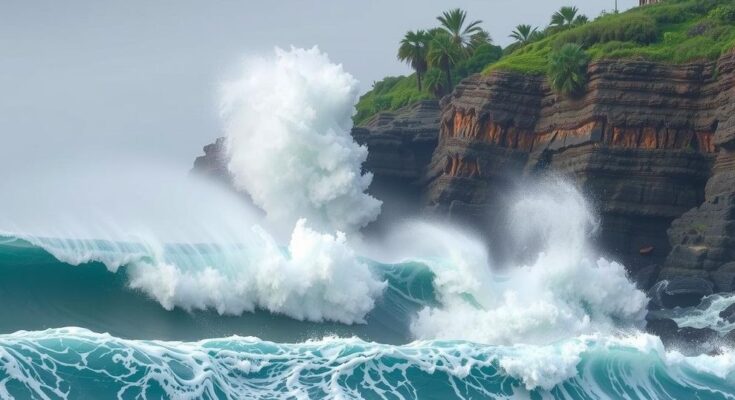A series of powerful waves, reaching up to 13 feet, have led to three deaths across Ecuador, Peru, and Chile, prompting the closure of nearly 100 ports. The extreme weather event has caused severe disruptions, particularly to the fishing industry, with warnings of ongoing risks and economic impacts.
As massive waves reaching heights of 13 feet have struck the coastlines of Ecuador, Peru, and Chile, the unfortunate toll has risen to three fatalities, prompting the closure of nearly 100 ports in these regions due to hazardous conditions. Ecuador’s Risk Management Secretary, Jorge Carillo, characterized the situation as an “extreme event” and cautioned that similar disturbances may occur in the future. The fatalities include two individuals from Ecuador’s Manta region and one from Chile, where a 30-year-old man was discovered dead on the beach.
In Peru, significant disruptions were reported as most ports were shut down amidst continuous battering from the waves. Enrique Varea, head of the Naval Oceanographic Department, indicated that while the tumultuous conditions are expected to persist in the coming days, a slight easing might occur by the following Monday, returning to normal by early January. Meanwhile, images depicted in local media revealed parts of Peru submerged under water, prompting residents to seek elevated areas for safety.
According to the Peruvian navy, these formidable waves are generated by strong winds originating from the U.S. coastline. Authorities have consequently closed numerous beaches along the central and northern parts of the country to mitigate any risks to public safety. Many fishing boats sustained damage, with some reporting losses of up to 100 vessels. Individuals dependent on fishing have expressed distress over the situation. Rescues were performed for thirty-one stranded fishermen, with reports indicating around 180 more fishermen remain at sea.
Callao, neighboring the capital Lima and home to Peru’s largest port, has also taken precautionary measures by closing several beaches and restricting tourism activities. The mayor of La Cruz district, Roberto Carrillo Zavala, highlighted that the local fishing communities have been hit hardest, expressing concerns over the economic ramifications. The National Emergency Operations Center in Peru forecasts that this phenomenon, which commenced on Christmas Day, is anticipated to continue through January 1.
The incident of massive waves striking the coasts of Peru, Ecuador, and Chile is a manifestation of extreme weather patterns that have resulted in significant safety concerns and economic damages for local communities. These natural disturbances have caused extensive damage to infrastructure, particularly affecting the fishing industry and local economies reliant on maritime activities. Authorities in the affected regions are calling for heightened awareness of weather phenomena and improved preparedness to handle such extreme events in the future. The incident underscores the urgent need for better risk management and response strategies as climate-related challenges increase in frequency.
In summary, the recent waves striking the coasts of Ecuador, Peru, and Chile have resulted in three tragic fatalities, widespread port closures, and significant disruption of local fishing activities. The affected regions face not only immediate safety concerns but also potential long-term economic impacts, particularly for local fishing communities. Authorities urge vigilance as similar extreme weather patterns may recur, emphasizing the importance of preparedness and risk management in the face of climate change-induced phenomena.
Original Source: thesun.my




